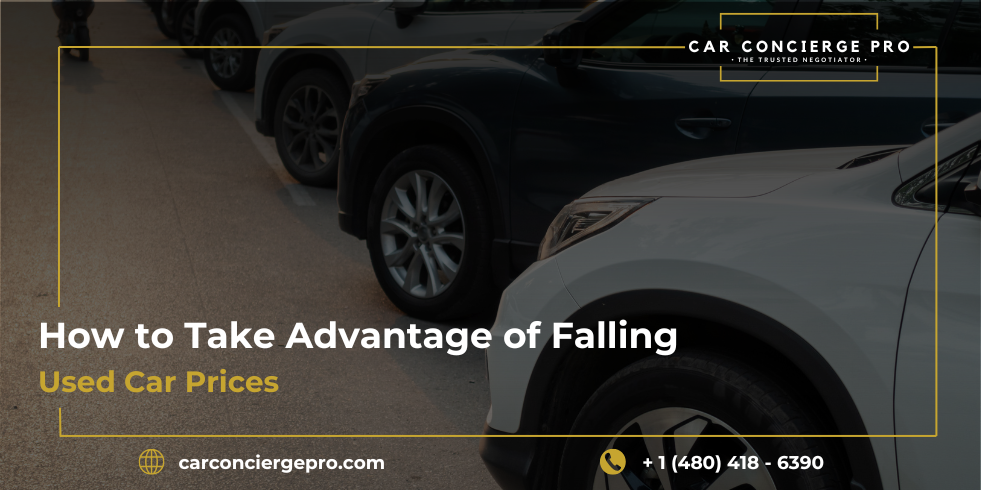The used car market has been fluctuating over the past few years, and if you’re in the market for a pre-owned vehicle, now could be the perfect time to strike. Falling used car prices are giving buyers an excellent opportunity to save money while securing a reliable vehicle. However, navigating this market requires a bit of strategy and insight to ensure you’re getting the best deal. In this article, we’ll explore how to take advantage of falling used car prices, what to look for, and how services like car concierge can simplify the process.
Table of Contents
ToggleUnderstanding the Trend of Falling Used Car Prices
Used car prices have been a hot topic in recent years, especially due to global supply chain issues, chip shortages, and fluctuating demand. During the pandemic, car prices soared as supply dwindled and demand remained high. However, as supply chains stabilize and consumer demand cools, used car prices are beginning to fall.
The drop in prices can be attributed to several factors:
- Increased Inventory: Manufacturers are catching up on production, leading to more used vehicles on the market.
- Decreased Demand: With rising interest rates and inflation, consumers are becoming more cautious in their spending, which has reduced the overall demand for used cars.
- Depreciation: The natural depreciation of vehicles over time continues to contribute to price reductions.
Despite the decline, not all used cars are experiencing the same price drop. Luxury vehicles or cars in high demand may hold their value better than others. It’s important to understand these dynamics to make the most of this window of opportunity.
Assessing Your Budget and Financing Options
One of the first steps to capitalizing on falling used car prices is assessing your budget. With prices dropping, you might be tempted to buy a car immediately, but taking the time to set a realistic budget will ensure that you don’t overextend yourself financially. Consider these factors:
- Down Payment: The more you can afford to pay upfront, the less you’ll need to finance.
- Loan Terms: Shop around for the best interest rates and loan terms. Even if prices are falling, high financing rates can offset your savings.
- Total Cost of Ownership: Beyond the purchase price, think about the total cost of ownership, which includes maintenance, insurance, and fuel efficiency.
If you’re uncertain about how much you can afford, it’s a good idea to use online loan calculators to get an estimate. Getting pre-approved for financing can also help you stay within your budget and negotiate more effectively.
Researching and Identifying the Best Deals
As used car prices fall, it’s important to identify vehicles that are not only affordable but also a good investment. Start by researching the models you’re interested in, taking into account factors such as reliability, fuel economy, and resale value. Some vehicles depreciate faster than others, while others maintain their value over the long term.
- Research Market Prices: Use online platforms like Kelley Blue Book or Edmunds to get a sense of the fair market value for the cars you’re considering. These tools allow you to compare prices across different dealerships and private sellers.
- Check Vehicle History: Always request a vehicle history report, especially for used cars. A report will tell you if the car has been in an accident, whether it has a clean title, and how many owners it’s had. Services like Carfax and AutoCheck provide detailed vehicle histories.
- Inspect the Car: Never buy a used car without inspecting it thoroughly or getting it checked by a professional mechanic. Even with falling prices, buying a car with hidden issues can end up costing more in the long run.
You can also look at cars that are being sold by individuals who need to move quickly due to financial or life circumstances. These types of sales can often result in better deals.
Timing Your Purchase to Maximize Savings
Timing plays a critical role in taking advantage of falling used car prices. While prices are on the decline overall, there are specific times when you are more likely to find the best deals. Here’s when you should be on the lookout for the best used car bargains:
- End of the Year: Dealers are looking to clear out their inventory to make room for new models, so you may find discounts on older cars.
- Off-Season: Winter months, particularly around December and January, are when demand tends to be lower, leading to potential price drops.
- Holiday Weekends: Major sales events, like Labor Day or Memorial Day, often coincide with significant price reductions on used vehicles.
In addition to these times, it’s important to be aware of the market trends. As mentioned, used car prices are falling, but if you’re waiting too long, the trend could reverse, especially if interest rates decrease or demand picks up again.
Negotiating Like a Pro
Once you’ve done your research and identified the car you want, it’s time to negotiate. Many buyers are hesitant to haggle, but it’s a key part of getting the best deal. Here are some tips for effective negotiation:
- Know the Market Value: Armed with the research you’ve done on the car’s market value, you’ll have a strong negotiating position. Be prepared to back up your offer with the data.
- Start Low: Offer a price that’s lower than what you’re willing to pay. This gives you room to move up during negotiations.
- Consider the Total Package: If the seller won’t budge on price, see if they can offer additional perks, such as a free oil change or a warranty extension.
- Be Prepared to Walk Away: Sometimes the best negotiation tactic is simply walking away. If the deal isn’t right, don’t be afraid to keep looking.
Remember, falling prices mean there’s less room for car dealerships to make huge profits, so don’t hesitate to make a reasonable but firm offer.
Using a Car Concierge Service for Expert Assistance
If you want to take the hassle out of the car-buying process while ensuring that you get the best deal, a Car Concierge Service could be an invaluable resource. These services act as your personal car buying assistant, helping you navigate the used car market with ease. A concierge can:
- Search for Cars on Your Behalf: Car concierges have access to networks of dealers and can find the perfect vehicle for you, often at better prices than what’s available to the general public.
- Inspect and Negotiate: They handle the technical details, ensuring the car is inspected and the price is right. They also take care of all the negotiation on your behalf.
- Save You Time: Instead of spending hours visiting dealerships and scouring the internet, a concierge service does all the legwork for you.
- Expert Advice: As an expert in the field, a car concierge ensures you get the best possible deal while avoiding common pitfalls.
For instance, CarConciergePro offers an extensive range of services to simplify the process of buying a used car. Their team works with clients to identify the best vehicles, negotiate prices, and ensure that the buying experience is as seamless and stress-free as possible. Whether you’re looking for a budget-friendly option or a more luxurious ride, their concierge services ensure that you’re getting the best value without the headaches.
Conclusion
Falling used car prices present an excellent opportunity for savvy buyers, but maximizing those savings requires careful research, timing, and negotiation. Understanding the market dynamics, evaluating financing options, and taking advantage of expert services like a car concierge can make the process easier and more rewarding. Whether you’re looking for a budget-friendly ride or a specific model, being proactive and informed will help you drive away with the best possible deal




 and Canada
and Canada 





